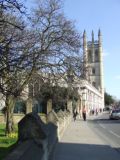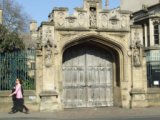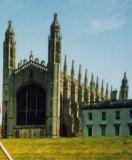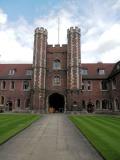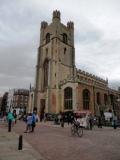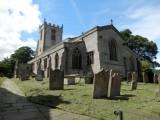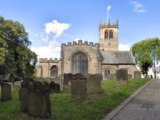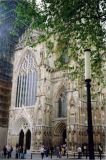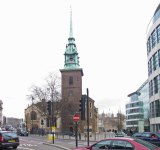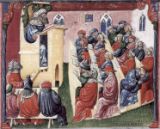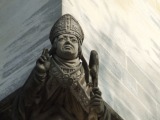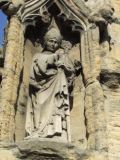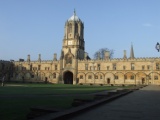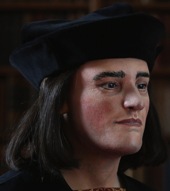As a law maker Richard clearly showed that his view on education was not only a religious duty, but went much further than that. While trying to limit the activities of foreign merchants in England the statutes of his only parliament included a Proviso, exempting all merchants and craftsmen concerned in the book trade from the scope of the Act. This was clearly intended to encourage a good supply of books. [Armstrong, p.276] Books were in his day the most up to date means of spreading ideas and learning. If he encouraged books, he must have supported the circulation of ideas.
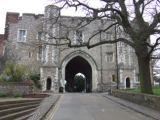
Abbey Gateway, St Albans (© D Preis)
The context between books and education becomes clear in the following example: Only a few years after William Caxton introduced the printing press to England in the mid 1470s, there was a printing press in St Albans as well, located in the Abbey Gateway. This was the third one in England, after Caxton’s in London and one in Oxford. We don’t know the identity of the St Albans printer, but he was referred to as “sometyme scole master of Saynt Albans”. [‘Printing in England’] The press in St Albans produced books between 1479 and 1486, eight of which have survived. The first six, printed between 1479 and 1483, were Latin university texts. It has been suggested that they were aimed at purchasers from Cambridge, where at that time no press had been established. [Orme, p.181]
We should not forget, however, that Richard’s appreciation for books was also a personal one. There are eighteen surviving texts, of which we know for sure that they are connected to him. In some he signed his name, two are dedicated to him and one has an indirect dedication. It seems likely that these are just a part of a far more extensive library, though without an inventory it is impossible to draw too many conclusions. [Sutton & Visser-Fuchs, ‘Richard III’s Books’, p.374] With these surviving books we can be sure that they belonged to him, because he put his name in the text itself. With others his name might have been on the flyleaf, which has got lost since then, or they might have been marked with his arms, which have since been changed to someone else’s. [Sutton & Visser-Fuchs, ‘Richard III’s Books’, p.381]
From his books, Sutton and Visser-Fuchs conclude that he was “an industrious and committed reader”, who showed a high level of education and literacy. This lead them to speculate that he could possibly in his early youth , as the youngest son, have been destined for the church, though this would have changed when his father and brother were killed and his brother Edward became king. [Sutton & Visser-Fuchs, ‘Richard III’s Books’, pp.384-385] Considering that many of the learned (church-) men among his close connections had humanist interests, it is surprising that among the books we know he owned there are no works of theology or humanist interest. All of us who like reading and books, can glimpse a kindred spirit when Sutton and Visser-Fuchs conclude that “He did not collect them [books] as objects but used them for what they could give him and others in the way of instruction, consolation and entertainment”. [Sutton & Visser-Fuchs, ‘Richard III’s Books’, p.385]
I think that all these examples of Richard’s relationships with learning, be it with learned men, the centres of learning, books ,as well as his activity as law maker shows clearly that learning was something close to his heart. I would like to close my talk with the words of the anonymous chronicler of Magdalen College in Oxford: “Vivat rex in eternum!”
Bibliography
Books:
Virginia Davis, William Waynflete, Bishop and Educationalist. Studies in the History of Medieval Religion. Boydell Press, Woodbridge, 1993. ISBN 9780851153490
Rhoda Edwards, The Itinerary of King Richard III 1483-1485. Richard III Society, 1983. ISBN 090489309X
Peter Hammond, Richard III and the Bosworth Campaign. Pen & Sword Military, 2010. ISBN 9781844152599
Maurice Keen, English Society in the Later Middle Ages, 1348-1500. Penguin Books, 1990. ISBN 9780140124927
A. H. Lloyd, The Early History of Christ’s College, Cambridge, Derived from Contemporary Documents. Cambridge Library Collection, 2010. ISBN 9781108008976 (First published in 1934)
J.M. Melhuish, The College of King Richard III Middleham. Richard III Society, London (undated)
Nicholas Orme, Medieval Schools: From Roman Britain to Renaissance England. Yale University Press, 2006. ISBN 9780300111026
Jeremy Potter, Good King Richard? An Account of Richard III and his Reputation. Constable Books, 1996. ISBN 9780094688407
Charles Ross, Richard III. Yale English Monarchs, Yale University Press, 1999, Reprinted 2005. ISBN 9780300079791
John Stow, A Survey of London, witten in the year 1598 by John Stow. Whittaker, London, 1842.
Anne F. Sutton & Livia Visser-Fuchs, The Hours of Richard III. Alan Sutton Publishing Pty Ltd, 1996. ISBN 9780750911849
Articles:
P.S. Allen, ‘Bishop Shirwood of Durham and His Library’, The English Historical Review, Vol. 25, No. 99 (July 1910), pp 445-456.
Elizabeth Armstrong, ‘English Purchases of Printed Books from the Continent 1465-1526′, The English Historical Review, Vol. 94, No. 371 (April 1979), pp. 268-290.
W. H. G. Armytage, ‘William Byngham: A Medieval Protagonist of the Training of Teachers’, History of Education Journal, Vol. 2, No. 4 (Summer 1951), pp. 107-110
Michael J. Bennett, ‘Education and Advancement’, in: Fifteenth-Century Attitudes: Perceptions of society in late medieval England, ed. Rosemary Horrox. Cambridge University Press, 2008, pp.79-96. ISBN 9780521589864
Christopher Brooke, ‘Urban church and university church: Great St Mary’s from its origins to 1523’, in: Great St Mary’s, Cambridge University’s Church, ed. John Binns & Peter Meadows. Cambridge, 2000, pp.7-24. ISBN 0521775027
R.B. Dobson, ‘Richard III and the Church of York’, in: Kings and Nobles in the Later Middle Age, ed. Ralph A. Griffiths & James Sherborne. 1986, pp.130-154
Rena Gardiner, ‘The Story of Magdalen’, Magdalen College (2003). URL: http://www.magd.ox.ac.uk/__data/assets/pdf_file/0010/4303/Illustrated_Magdalen_College_History.pdf Date accessed: 13 July 2010
Robert C Hairsine, ’Oxford University and the Life and Legend of Richard III’, in: Richard III: Crown and People, ed. J Petre. Richard III Society, 1985, pp. 307-332. ISBN 9780904893113
Rosemary Horrox, ‘Richard III and Allhallows Barking by the Tower’, The Ricardian, Vol.VI, No.77 (June 1982), pp.38-40
Rosemary Masek, ‘The Humanistic Interests of the Early Tudor Episcopate’, Church History, Vol. 39, No. 1 (March 1970), pp. 5-17.
Anne F. Sutton, ‘’A Curious Searcher for our Weal Public’: Richard III, Piety, Chivalry and the Concept of ‘The Good Prince’’, in: Richard III: Loyalty, Lordship and Law, ed. P.W. Hammond. Richard III and Yorkist History Trust, 2000, pp.69-105. ISBN 9781900289375
Anne F. Sutton, ‘Richard of Gloucester’s Lands in East Anglia’, in: Richard III and East Anglia: Magnates, Gilds and Learned Men, ed. Livia Visser-Fuchs. Richard III Society, 2010, pp.1-30. ISBN 9780904893199
Anne F. Sutton & Livia Visser-Fuchs, ‘Richard III’s Books Observed’, The Ricardian, Vol.IX, No.120 (March 1993), pp.374-388
Anne F Sutton and Livia Visser-Fuchs, ‘Richard III, the Universities of Oxford and Cambridge, and Two Turbulent Priests’, The Ricardian, Vol. XIX, 2009, pp.95-109
Anne F. Sutton & Livia Visser-Fuchs, ‘’As dear to him as the Trojans were to Hector:’ Richard III and the University of Cambridge’, in: Richard III and East Anglia: Magnates, Gilds and Learned Men, ed. Livia Visser-Fuchs. Richard III Society, 2010, pp.105-142. ISBN 9780904893199
Barrie Williams, ‘Richard III’s Other Palatinate: John Shirwood, Bishop of Durham’, The Ricardian, Vol.IX, No.115 (December 1991), pp.166-169
B.P. Wolffe, ‘The Management of English Royal Estates under the Yorkist Kings’, The English Historical Review, Vol. 71, No. 278, Jan. 1956, pp. 1-27.
British History Online:
‘Colleges: Barnard Castle’, A History of the County of Durham: Volume 2 (1907), pp. 129-130. URL: http://www.british-history.ac.uk/report.aspx?compid=39906 Date accessed: 5 November 2010
‘The history of All Hallows Church: To c.1548’, Survey of London: volume 12: The parish of All Hallows Barking, part I: The Church of All Hallows (1929), pp. 1-20. URL: http://www.british-history.ac.uk/report.aspx?compid=100058 Date accessed: 8 April 2012
‘The colleges and halls: Queens’’, A History of the County of Cambridge and the Isle of Ely: Volume 3: The City and University of Cambridge, 1959, pp. 408-415. Online URL: https://www.british-history.ac.uk/vch/cambs/vol3/pp408-415 [last accessed 22 May 2020]
Oxford Dictionary of National Biography:
Cecil H. Clough, ‘Gunthorpe, John (d. 1498)’, Oxford Dictionary of National Biography, Oxford University Press, 2004; online edn, May 2009. URL: http://www.oxforddnb.com/view/article/11752 Date accessed: 10 March 2011
Virginia Davis, ‘Waynflete , William (c.1400–1486)’, Oxford Dictionary of National Biography, Oxford University Press, 2004. URL: http://www.oxforddnb.com/view/article/28907 Date accessed: 20 Jan. 2011
Michael Hicks, ‘Neville, George (1432–1476)’, Oxford Dictionary of National Biography, Oxford University Press, 2004; online edn, Jan 2008. URL: http://0-www.oxforddnb.com.library.sl.nsw.gov.au/view/article/19934 Date accessed: 14 April 2011
Jonathan Hughes, ‘Barowe , Thomas (d. 1499)’, Oxford Dictionary of National Biography, Oxford University Press, 2004. URL: http://www.oxforddnb.com/view/article/1503 Date accessed: 10 March 2011
Peter Partner, ‘Wykeham, William (c.1324–1404)’, Oxford Dictionary of National Biography, Oxford University Press, 2004; online edn, May 2009. URL: http://www.oxforddnb.com/view/article/30127 Date accessed: 7 March 2011
A.J. Pollard, ‘Shirwood, John (d. 1493)’, Oxford Dictionary of National Biography, Oxford University Press, 2004; online edn, Jan 2008. URL: http://www.oxforddnb.com/view/article/25447 Date accessed: 10 March 2011
John A. F. Thomson, ‘Russell, John (c.1430–1494)’, Oxford Dictionary of National Biography, Oxford University Press, 2004; online edn, Jan 2008. URL: http://www.oxforddnb.com/view/article/24318 Date accessed: 10 March 2011
D. P. Wright, ‘Langton, Thomas (c.1430–1501)’, Oxford Dictionary of National Biography, Oxford University Press, 2004; online edn, May 2009. URL: http://www.oxforddnb.com/view/article/16045 Date accessed: 10 March 2011
Internet sites:
‘Middleham Collegiate Church’, URL: http://www.britannia.com/tours/yorksmon/middleham.html Date accessed: 27 March 2010
‘St Mary’s Barnard Castle’, URL: http://www.stmarysbarnardcastle.org.uk/ourparish/43-st-marysbarnardcastle Date accessed: 17 March 2010
‘Church on mission to revamp building’, Teesdale Mercury (2 March 2010). URL: http://www.teesdalemercury.co.uk/teesdale-news/story,2513.html Date accessed: 17 March 2010
‘History of the Chapel’, King’s College Cambridge. URL: http://www.kings.cam.ac.uk/chapel/history.html [last accessed 22 May 2020]
‘Printing in England from William Caxton to Christopher Barker – An Exhibition: November 1976 – April 1977’, University of Glasgow. URL: http://special.lib.gla.ac.uk/exhibns/printing/ Date accessed: 16 April 2012
Part 1 – Richard III and Learned Men
Part 2 – Richard III as the Founder of Collegiate Churches
Part 3 – Richard III and the Universities of Oxford and Cambridge
Tags: Books, Cambridge, Church, Learning, Oxford, Richard III
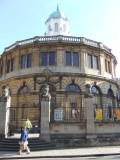 Charter granted to the University of Oxford to appoint a chancellor by Nicholas de Romanis, the papal legate.
Charter granted to the University of Oxford to appoint a chancellor by Nicholas de Romanis, the papal legate.